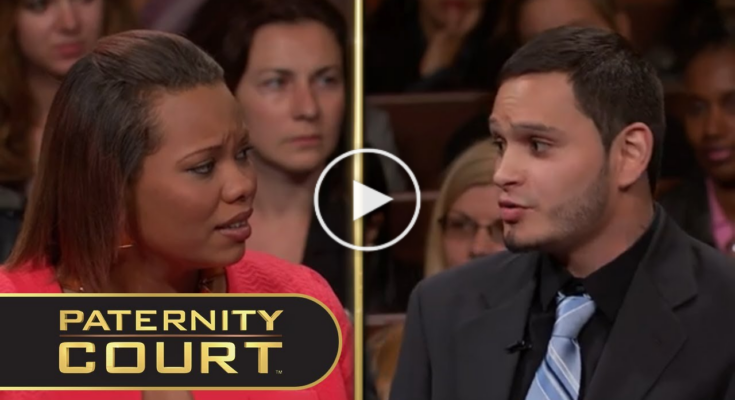“This is the case of Rice v. Debaca,” the court announces as Ms. Rice seeks to establish Mr. Debaca as the father of her unborn child. Amidst accusations of infidelity, financial obligations, and emotional turmoil, the court relies on non-invasive prenatal paternity testing to determine the true biological father of the fetus.
The court proceedings shed light on the tumultuous nature of Ms. Rice and Mr. Debaca’s relationship. It all began about “a year-and-a-half ago,” when they embarked on a friendship with benefits, devoid of any formal commitment. Despite their casual arrangement, their lives became intertwined, leading to numerous break-ups and reconciliations.
Amidst the constant emotional rollercoaster, Ms. Rice claimed pregnancy every time they separated, causing skepticism and doubt on Mr. Debaca’s part. The repetitive pattern of breaking up and reuniting, coupled with the uncertainty surrounding their commitment to each other, further muddies the waters regarding the unborn child’s paternity.
The courtroom drama also touches on financial disputes between the couple. Ms. Rice claims that after Mr. Debaca moved back to Colorado, she informed him of her pregnancy. Believing him to be excited about the news, she purchased a plane ticket for him, costing $100, as he promised to return to be with her. However, Mr. Debaca failed to board the flight, leaving her with no option but to change it twice, incurring $50 in change fees each time. Ms. Rice also claims to have sent him money multiple times, supporting his needs and cravings, but he vehemently denies ever asking for or receiving any financial assistance.
To resolve the paternity dispute definitively, the court employs “non-invasive prenatal paternity testing.” This relatively new procedure uses a blood sample from the mother to determine with high certainty whether the alleged father is the biological father of the fetus. The results confirm that Mr. Debaca is indeed the father of Ms. Rice’s unborn child.
The revelation of the DNA results significantly impacts the dynamics of the courtroom. Mr. Debaca apologizes to Ms. Rice, stating, “I’m sorry, Destiny. I really am. Okay. And I will take care of the baby.” This pivotal moment marks a potential turning point in their relationship. However, the court cautions against using a child as a means to sustain a relationship, emphasizing the importance of mutual love and commitment.
Throughout the courtroom proceedings, emotions run high as Ms. Rice confronts Mr. Debaca about his actions and behaviors. Her hurt and vulnerability are evident, revealing the depth of her feelings for him. In stark contrast, Mr. Debaca appears guarded, struggling to articulate his feelings and intentions. The couple’s conflicting accounts of their relationship and their feelings for each other highlight the complexities of their emotional entanglement.
The court’s ruling, confirming Mr. Debaca’s paternity, brings a sense of clarity to the situation. Nevertheless, it also raises questions about the couple’s readiness to co-parent and nurture a child together. The unresolved issues of trust, commitment, and communication linger in the air, demanding honest introspection from both parties.
The case of Rice v. Debaca serves as a poignant reminder of the complexities surrounding paternity disputes and the emotional toll they can take on individuals involved. The utilization of “non-invasive prenatal paternity testing” highlights the advances in genetic technologies to determine paternity with greater accuracy and safety.
The court’s ruling validates Mr. Debaca as the father of the unborn child, calling for both parties to take responsibility and provide a supportive environment for their child’s upbringing. The decision also underscores the importance of open communication, mutual respect, and honesty in establishing and maintaining healthy relationships.
In the realm of paternity disputes, advancements in genetic testing continue to play a crucial role in settling such disputes objectively. As this case demonstrates, it is essential for individuals to act responsibly and thoughtfully when confronted with such circumstances, with the child’s well-being remaining the foremost consideration. The legal system, combined with scientific advancements, ensures that “the truth prevails,” promoting fairness and clarity in paternity matters.
Ultimately, the outcome of this case may serve as a catalyst for personal growth and self-reflection for both Ms. Rice and Mr. Debaca. They must navigate the challenging path of co-parenting, guided by love, understanding, and unwavering support for their child’s future. With the DNA results now settled, it is their responsibility to prioritize the child’s needs and ensure a stable and nurturing environment for their offspring.
As society progresses, we are continually reminded of the significance of genetic technology and its role in resolving intricate matters like paternity disputes. However, even as we embrace the objectivity that science brings, we must also remember the significance of emotions, empathy, and compassion in shaping the destiny of families and their children. The case of Rice v. Debaca serves as a powerful reminder of the profound human emotions intertwined with scientific precision, and it urges us to approach such situations with sensitivity and empathy.



